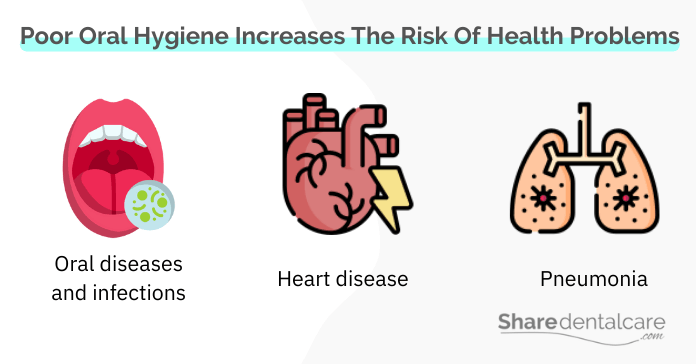Oral hygiene for the elderly with no teeth is important to keep their mouth healthy and prevent health problems. Oral hygiene is important for everyone at every stage of life, but it becomes increasingly important as people age. As we get older, our ability to clean our mouth decreases. The mouth also changes over time so that different problems arise as a person ages. A common problem with the elderly with no teeth is sore, painful gums, especially with dentures. With dentures, the food particles get trapped between the gums and denture base, causing bad breath and gum disease.
Why Oral Hygiene is Important for the Elderly with No Teeth?
Oral health is a significant factor affecting overall health and quality of life for elderly people. If oral hygiene is not properly taken care of for the elderly with no teeth, it can increase the risk of health problems such as oral diseases and infections, oral ulcers or sores, difficulty eating or swallowing food, pneumonia in the lungs, and cancer of the mouth.
Oral health for elderly people is very important so they can enjoy food and drinks without problems. It helps them to be active, happy, involved in social activities and prevents visits to the dentist.
Poor Oral Hygiene Increases The Risk Of Health Problems
Poor oral hygiene causes the accumulation of plaque on the gums and tongue. Dental plaque is a sticky colorless film that is made from bacteria and food debris. These bacteria can cause oral diseases and overall health problems.
- Oral diseases and infections: certain oral diseases or infections may be more common in the elderly due to their compromised immune systems, such as gum disease (bacterial infection in the gums) and oral thrush (fungal infection). Also, poor oral hygiene can cause white tongue.
- Oral ulcers and sores: they can cause serious health problems. Ulcers and sores make it hard for the elderly to eat food and drink, which affects their overall health.
- Denture stomatitis: oral infections are more common in elderly people who wear dentures. Denture stomatitis is usually caused by oral bacteria, food debris that gets trapped between the gums and denture base.
- Heart disease: according to Harvard, people with gum disease have a higher risk of having a heart attack, stroke, or another serious cardiovascular event.
- Diabetes: according to ADA, poor oral hygiene and oral infections increase the risk of developing diabetes or make it worse.
- Pneumonia in the Lungs: poor oral hygiene increases the risk of bacterial pneumonia because mouth bacteria may spread to the lungs.
- Cancer of the Mouth: the elderly have compromised immune systems. Poor oral hygiene habits such as smoking, increase the risk of oral cancer.

How to Maintain Good Oral Hygiene for the Elderly with No Teeth?
Tips on oral hygiene for the elderly with no teeth include: brushing regularly, cleaning dentures daily, oral rinses with fluoride, and regular dental visits.
- Brush regularly: encourage them to brush the gums, lips, and cheeks regularly to remove plaque and food debris. If the gums are sensitive, they can use a washcloth to gently remove plaque.
- Brush the tongue: oral bacteria thrive in the warm, moist environment of the oral cavity. This is why oral hygiene for elderly people with no teeth needs to include cleaning their tongues regularly.
- Oral rinses with fluoride: oral rinses include antibacterial and antimicrobial ingredients which can kill bacteria.
- Healthy diet: encourage the elderly to eat healthy food and drink plenty of water as this will help oral health.
- Clean dentures daily: remove dentures before going to bed or when doing oral hygiene. Clean them thoroughly after every meal. Ill-fitting dentures should be relined or replaced. Oral hygiene for the elderly with no teeth is important, especially if they wear dentures.
- Stop smoking: encourage your elderly family members to stop smoking to minimize the risk of oral infections and cancer.
- Regular dental visits: regular visits to the dentist can help detect oral diseases early, which would then be easier to treat and prevent complications.
Oral Hygiene for Elderly with No Teeth – Conclusion
Oral hygiene for elderly people with no teeth is important, especially if they wear dentures. Poor oral hygiene causes the accumulation of plaque on the gums and tongue. Dental plaque is a sticky, colorless film that is made from bacteria and food debris. These bacteria can increase the risk of oral diseases and overall health problems such as oral thrush, heart disease, diabetes, and pneumonia. So, you should encourage your elderly to maintain good oral hygiene as this will help them keep their oral health and overall health in good condition.